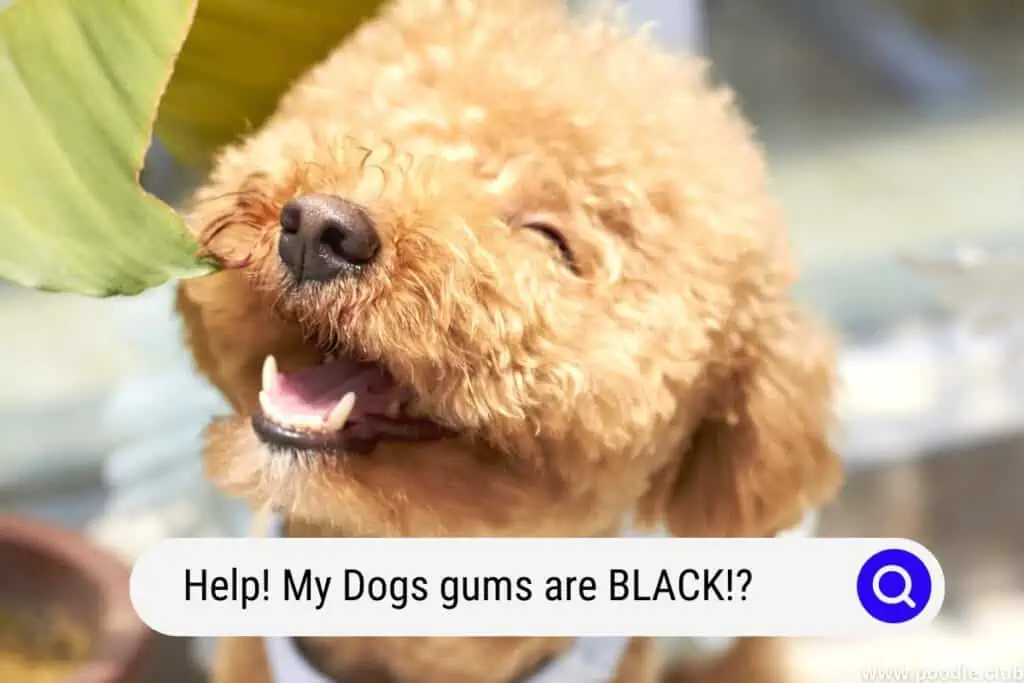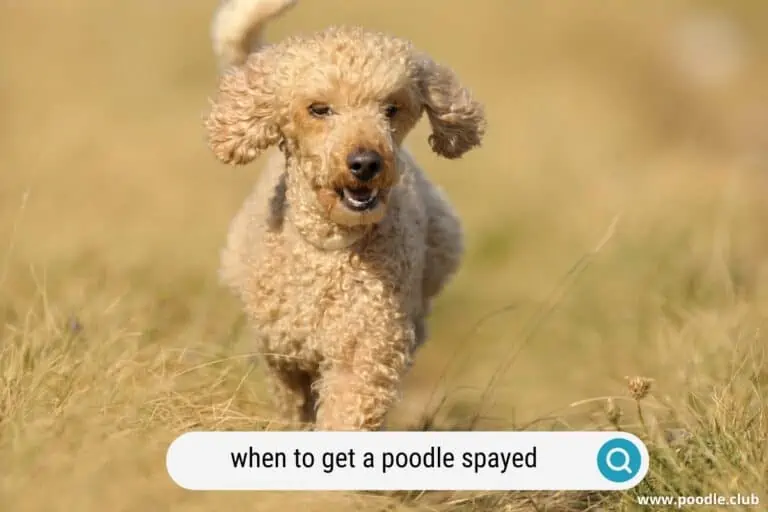Dog Gums Are BLACK [Is This Normal?]
If you were playing around with your dog or getting some sloppy kisses and noticed their gums look black, you may have some concerns. After all, if you had black gums, you would think something was wrong.
But are black dog gums normal? Or cause for alarm?

Read this article to find out and also learn how to properly take care of your pup’s teeth so they can stay happy and healthy.
Are Black Gums Normal for Dogs?
Black gums are normal on some dog breeds. While black gums on a human are cause for serious concern, black gums on dogs can be natural and normal, depending on the breed, especially black spots on their gums, which can be common.

If your dog’s gums are turning black, as in they were not always this color, then there may be something wrong with their mouth or teeth. A change or observation that normally pink dog gums are black is a concern.
Dog Breeds with Black Spots
As mentioned, some breeds naturally have these black spots on their gums, while others do not.

If you have one of the breeds listed below and notice black spots or areas in their mouth, it is likely just a genetic trait and not a health issue:
PuppySpot is a reputable dog marketplace where you can browse and find compatible puppies right from the comfort of your home. They have placed over 200,000 puppies into homes in the US!
- Australian Shepherd
- Chow Chow
- Dalmatian
- Irish Setter
- Newfoundland
- Mastiff breeds
- Pit Bull breeds
- Shar Pei
Common Causes of Black Gums
Before panicking, consider if one of these harmless things could be making your dog’s gums look black. It could be something they ate or just something in their DNA.

Colored Treats
Sometimes dog treats have artificial dyes to make them look fun; this is really for the humans and not the dogs. Well, if you buy black dog treats, which aren’t common but do exist, this may cause their gums to appear black for some time.
You can wait until they drink water and eat something else or brush their teeth to see if the black goes away.
A Genetic Trait
As discussed, genetic pigmentation is the most likely reason for black dog gums. A handful of breeds have black pigmentation naturally in their mouths. This pigmentation is no cause for alarm.
It’s just a genetic trait like-colored patches in their fur or the color of their nose.
Black Toys
Some toys, especially cheaply made ones, can leave dye and fuzz in your dog’s mouth. If the toy happens to be black, you may think that their tongue or gums are turning slightly black. If you suspect it could be a toy, brush their teeth or wait a day and see how they look.
Health Conditions Associated With Black Gums
If your dog’s gums have begun to turn black and you’ve noticed this change in color, they may be suffering from a health condition. Visit your veterinarian to determine the exact cause, but it could be one of the problems listed below.

Periodontal Tumors
Periodontal tumors are masses of growth in your dog’s mouth. Tumors can be benign, which means they need to be removed. But tumors can also be cancerous, which is a severe problem.
You need to consult a veterinarian to find out what actions must be taken.
Melanoma
Melanoma is the most common type of oral malignancy in dogs. It falls into the category of periodontal tumors but is the most serious of them all and is worth mentioning on its own.
Periodontal Disease
Periodontal disease is often caused by a lack of proper oral hygiene or an excess of foods that are harmful to teeth and gums. Consistent dental care is the best way to prevent periodontal disease, which can be very uncomfortable for your dog and lead to more severe health problems.
Gingivitis
Gingivitis is a terrible and harmful disease that begins in the mouth. A thin black line that runs along the gum or black areas around the teeth can be the beginning signs of gingivitis. Have this looked at right away, so you can catch the disease before it progresses.
Acanthosis Nigricans
Acanthosis nigricans is a skin disease that is rare in dogs but can occur. It results in discoloration of the skin, including areas in the mouth like your gums or tongue. The gums will darken slightly, and you may notice other dark spots on their belly.
What if My Dog’s Tongue Is Black?
If you notice your dog’s tongue is black, it can be for one of the same reasons that a dog’s gums may be black. It could be due to genetic pigmentation or it could be caused by a serious health condition. The only way to be sure is to visit your vet.

What Can You Do?
There are human medications that people sometimes give their dogs to reduce the black, but this is extremely dangerous. Human medicine can be extremely toxic to dogs, resulting in a different illness or even death.

Do not attempt any home treatment on your dog’s black gums. If you feel the black gums are new and not caused by a genetic pigmentation, you should see your veterinarian as soon as possible for a proper diagnosis.
Doggie Dental Hygiene Tips

Here are some helpful doggie dental tips to make sure your pup’s teeth stay pearly white and perfectly healthy:
- Brush their teeth with canine toothpaste. This task may sound like a pain, but you only need to do it once a week, and it takes less than ten minutes!
- Ask your vet if you should switch to dental health food; this is best for older dogs.
- Add a dental powder to your dog’s food to keep their enamel and teeth strong to avoid puppy cavities.
- There are also water additives that can improve and maintain your dog’s dental health.
- There are many doggie dental treats that can improve your dog’s teeth health, plus they get a tasty snack.
Final Thoughts
In the end, you should always take your dog to the vet if you think something is wrong with them. Black gums are often just a genetic trait from a parent breed, but it could be more serious.
Practice good dental hygiene on your dog to avoid gum disease, and you can keep an eye on their color.




![How to Brush a Poodle? [Properly]](https://poodle.club/wp-content/uploads/2022/12/how-to-brush-a-poodle-768x512.webp)
![Why Do Poodles Shake? [5 Reasons]](https://poodle.club/wp-content/uploads/2022/12/why-do-poodles-shake-768x512.webp)

